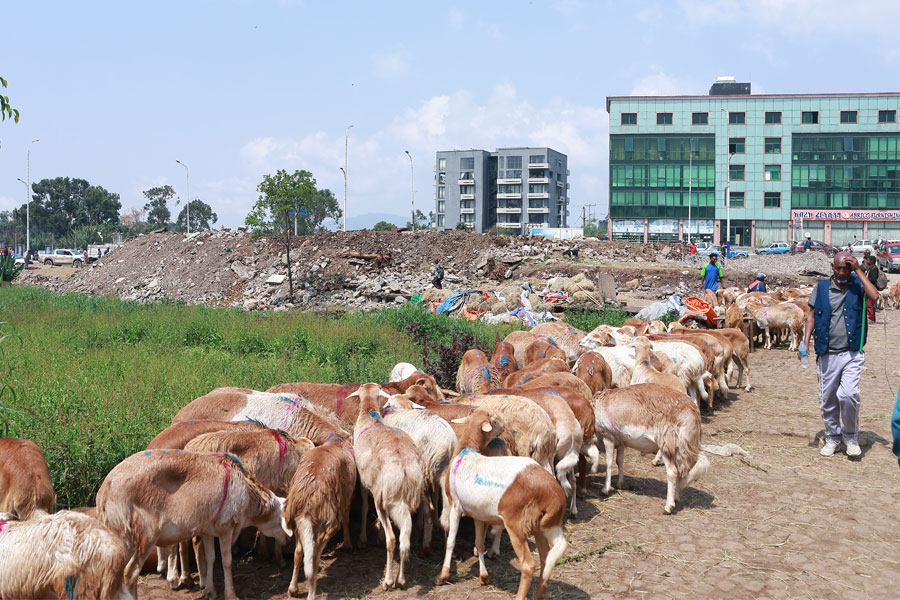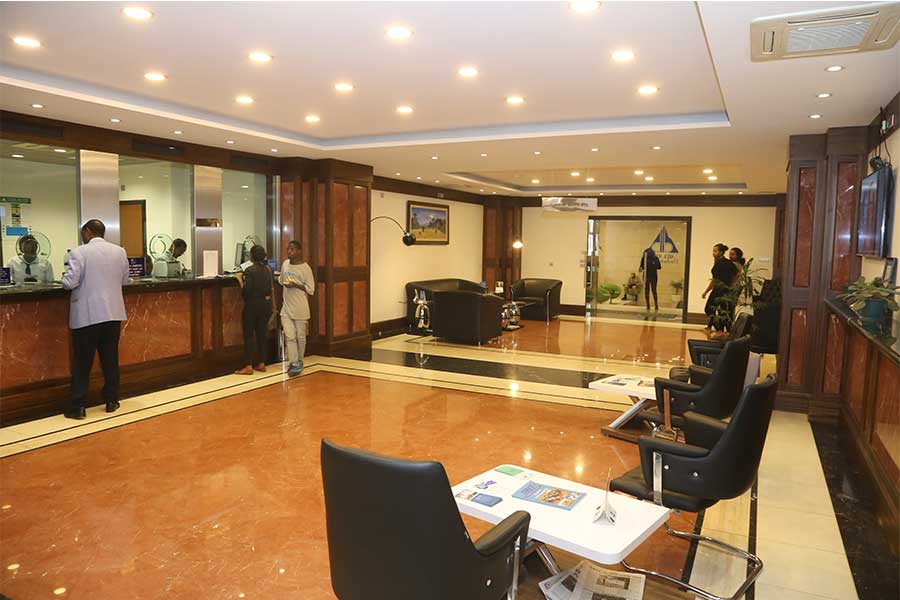
Agenda | May 04,2024
Abel Hailu was a second-year student when the Novel Coronavirus (COVID-19) pandemic set foot in Ethiopia in early 2020. He was studying at the machine department at Misrak Polytechnic College, one of the 15 Technical, Vocational Education & Training (TVET) schools across the country that reports to the TVET Institute. Soon after COVID-19 became this year's game changer, the government ordered a nationwide shutdown of schools in an attempt to curb and contain transmission of the virus.
Over 30 million students across the country, including Abel, were told to stay home.
The pandemic has been disruptive, to say the least, but it has also brought about much innovation. Youngsters who were forced to stay at home with fewer school activities have started to come up with innovative ideas to explore their skills.
From the early days of the pandemic up to June, over 500 innovations have been registered under the Ministry of Innovation & Technology.
For Abel, the lockdown was an opportunity to use his skills to help the community in battling the virus. It was a time to consider the paths of transmission of the virus, to think about how to use innovation to help people keep themselves safe, and to imagine what COVID-19 preventive appliances could be invented with readily available materials.
He met for discussions with three of his peers who are students of the electric, information technology, and garment departments at the polytechnic school. They shared their ideas.
Abel and his friends understood that the virus spreads mainly through physical contact between people, and they then started to think about how and what to work on to minimise contact between members of the community. They also took into consideration what tools they had at their disposal to execute their ideas.
Two weeks into the shutdown, Abel and his mates had solidified their objectives and collected the necessary materials and inputs for the inventions they had planned. They decided to create a motion-sensing hand washing machine using photo-sensor equipment from the polytechnic college.
They asked the school to cede them the sensors and the college obliged. Within a short couple of weeks, the resourceful group of students had successfully created their contraption. The machine automatically senses movement and spouts water so that people can wash their hands without touching the machine.
"This was to avoid physical contact,” said Abel.
Abel has also invented an electric control box that can be used to start, stop or adjust other electric devices remotely. The machine has a timer with a range from a microsecond to an hour and was created for use by those who are bed-ridden or too ill to move around. It can be used to charge mobile phones, for example, or to heat a pot of food.
In addition to these contraptions, Abel and his friends have created a massaging backpack, a traffic light with new features, and over 10 other innovations.
A person sanitising his hands with chemicals poured from photo-sensing machines that were made to avoid physical contact.
Other groups of entrepreneurial individuals have also been working on innovations to fight the spread of COVID-19.
"Handwashing alone isn't a guarantee for safety from the virus; it can also be spread via our clothes and accessories that we wear,” remarked Melese Yigzaw, dean of Nefas Silk Polytechnic College.
When the College was shut down, it organised instructors from the manufacturing, metal, construction, electrical and garment departments to come up with innovations to combat the pandemic.
The instructors have since delivered several appliances, including a body-disinfecting machine. The apparatus is fixed on either side of a doorway, and it sprays vaporised disinfectant over people when they pass through it. The instructors used nozzles and dynamos from vehicles that are kaputto build the machine.
The body-disinfecting machine has the capacity to spray four people at a time.
It has become common throughout the capital to see public and private institutions put hand-washing machines at entrances so that people have their hands clean before entering the premises. Most of these hand-washing stations are not automated and work manually. Users press a pedal with their foot to pour water so that they can wash their hands without the need to touch anything.
Lemmi Yadeta, instructor and department head of electrical electronics at Nefas Silk Polytechnic College, had begun to think about what could be innovated other than these pedal-operated, hand-washing contraptions.
“There are already pedal hand-washing machines in many places,” he said.
He and his friend devised four inventions: an automated sanitiser machine, the motion-sensing hand-washing machine, an automatic pool body device, and a smart school gate device.
Among the innovations, the school gate device was aimed at avoiding contact between students and guards at entrances of educational institutions. The device reads student identification cards and automatically opens the gate when it detects a valid ID.
“I thought of the idea two years ago when there was instability in universities but only had the chance to materialise it recently,” said Lemmi.
He and his colleagues have already planned to commercialise the smart school gate device. They hope to start mass production soon and sell them to education centres.
In explaining the factors for the spike in the amount of innovation in the country, he says that before the pandemic, polytechnic colleges and faculty were mostly focused on theory and not practical skills.
“The pandemic has pushed us to apply the theory in practice,” he remarked.
Yeka Industrial College is also planning to give training to micro and small enterprises regarding the innovations, to allow them to be mass produced and commercialised, according to Yirgalem Mehari, industry extension & technology transfer dean at the College.
Many innovations such as pedal-operated hand-washing stations, motion-sensor hand-washing machines that work with solar power, as well as medical beds, have so far been produced at Yeka.
Assefa Garbi, an assistant professor of entrepreneurship & business management at Kotebe Metropolitan University, argues that necessity brings about innovation as Ester Boserup, the Danish demographer, had said centuries ago when arguing that problems force people to look for solutions and engage in innovation to sustain themselves.
Assefa said that more innovations are coming out due to the problems confronting people during the pandemic.
“People usually think, imagine and create innovations to tackle the challenges,” he said.
The expert urges that the entrepreneurs mass produce and commercialise their products in order that they become viable in terms of marketability and utility to consumers.
Assefa was critical of most of the innovations other than sanitation products that can always be used by hotels and restaurants. Many other were designed and made for momentary utility and will be rendered obsolete when COVID-19 passes. He said that innovators should take this into account and consider producing innovations with multiple functionalities to be able to market them for a longer period of time.
By this idea, Abel and his mates have invented the machine that sanitises air via ultraviolet light and doubles as an air conditioner. This device has the capability of sanitising the air in a 36Sqm room within 10 minutes.
The air conditioning feature was added to the device so that the machine could also be utilised in the post-COVID-19 period, according to Abel.
Assefa also argued that the underdeveloped patent rights system might challenge the innovators when they opt for commercialisation.
He argues these innovations are vital factors for entrepreneurship and can create many jobs. He also says that entrepreneurs struggle with limited access to financial package services.
Financial institutions demand collateral and financial background information from the potential entrepreneurs to give them loans, according to Assefa.
High loan interest rates are also another roadblock to innovation commercialisation efforts, argued the expert.
To tackle this, he urges the government, particularly the Jobs Creation Commission, to allocate credit to innovators.
"There are no angel investment firms and incubation centres with complete ICT facilities," says Assefa, citing other impediments to the development of innovations and entrepreneurship. He recommended that the government establish such centres with prototypes to help innovators efficiently commercialise their inventions.
The Jobs Creation Commission has already crafted a programme dubbed the Innovative Challenge Fund to help innovators and entrepreneurs financially.
Alemtsehay Dersolign, director of innovative jobs & projects at the Commission, says that they will soon start registering anyone with innovations to get funding.
"After getting through their proposals," said Alemtsehay, "We'll pick 50 of them to receive support to scale their ideas into businesses."
The project will provide the winning innovators with incubation and entrepreneurship training, as well as financial support. The top three inventors will also be awarded gold, silver and bronze medals.
A few months ago, the United Nations Development Programme (UNDP) had granted one million dollars in funding to the Ministry of Innovation & Technology to be channeled to tech-savvy and innovative youth who will develop homegrown solutions helpful in the fight against the pandemic.
PUBLISHED ON
Nov 21,2020 [ VOL
21 , NO
1073]

Agenda | May 04,2024

My Opinion | Mar 25,2023

Commentaries | Jun 29,2024

Radar | Apr 10,2021

Exclusive Interviews | Apr 19,2025

Viewpoints | Jul 13,2020

Featured | Jul 27,2019

Radar | May 20,2023

Fortune News | Apr 10,2021

Commentaries | Jul 15,2023

Dec 22 , 2024 . By TIZITA SHEWAFERAW
Charged with transforming colossal state-owned enterprises into modern and competitiv...

Aug 18 , 2024 . By AKSAH ITALO
Although predictable Yonas Zerihun's job in the ride-hailing service is not immune to...

Jul 28 , 2024 . By TIZITA SHEWAFERAW
Unhabitual, perhaps too many, Samuel Gebreyohannes, 38, used to occasionally enjoy a couple of beers at breakfast. However, he recently swit...

Jul 13 , 2024 . By AKSAH ITALO
Investors who rely on tractors, trucks, and field vehicles for commuting, transporting commodities, and f...

Nov 1 , 2025
The National Bank of Ethiopia (NBE) issued a statement two weeks ago that appeared to...

Oct 25 , 2025
The regulatory machinery is on overdrive. In only two years, no fewer than 35 new pro...

Oct 18 , 2025
The political establishment, notably the ruling party and its top brass, has become p...

Oct 11 , 2025
Ladislas Farago, a roving Associated Press (AP) correspondent, arrived in Ethiopia in...